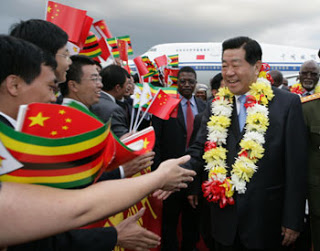

| Online: | |
| Visits: | |
| Stories: |

| Story Views | |
| Now: | |
| Last Hour: | |
| Last 24 Hours: | |
| Total: | |
China-Zimbabwe Conflict Heats Up
 |
| Photo credit: xinhuanet.com |
Great analysis by SAIS Ph.D. student Yun Sun, non-resident analyst at Brookings: “China’s pains over Zimbabwe’s indigenization plan,”April 26, 2016.
The announcement that Zimbabwe would require 51 percent indigenous ownership for all foreign investments was made some time ago, and since then, the issue has been debated in the courts and policy circles. As I noted in a 2014 story in this blog: “China: Exempt from Zimbabwe's Indigenization Policy?” many believed that Chinese companies were exempt but this was never the case, as I pointed out then, and as we are seeing now.
One Chinese company, Tian Ze, active in the tobacco sector working with local black tobacco farmers, was exempted from the requirement due to its extensive involvement in propping up the local farming effort.
Yun Sun makes another important observation:
Zimbabwe’s indigenization is yet another case of China’s lack of preparedness toward local sovereign risks and a lesson in how to operate in less developed, authoritarian countries with poor investment environment.
I would add to this that Zimbabwe (like Sudan/South Sudan) remains an important case where we continue to clearly see multiple examples of diplomatic efforts aimed at changing/influencing domestic policies (and politics). As these cases suggest, just what “non-interference in internal affairs” means continues to change, and Africa may be where we can see this most clearly.
Source: http://www.chinaafricarealstory.com/2016/04/china-zimbabwe-conflict-heats-up.html


